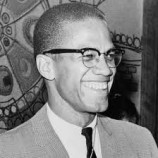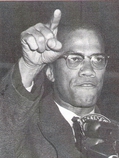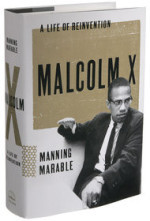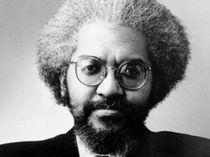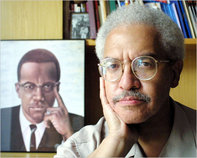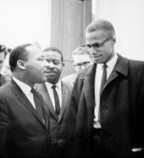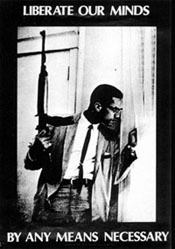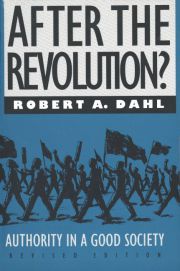Page under construction
Life of Malcolm X (1925-1965) - el-Hajj Malik el-Shabazz born Malcolm Little in Omaha, Nebraska, May 19, 1925
The most complete collection of Malcolm X speeches and interviews ever assembled, The Complete Malcolm X contains more than 12 hours of video, 28 hours of audio, 250 pages of speech transcriptions, over 4,000 pages of FBI files and more: over 40 hours of material in total on one DVD. Read more
And here, the Malcolm X - Official Website
Malcolm X (1925-1965)
BlackPast.org
Malcolm X, one of the most influential African American leaders of the 20th Century, was born Malcolm Little in Omaha, Nebraska on May 19, 1925 to Earl Little, a Georgia native and itinerant Baptist preacher, and Louise Norton Little who was born in the West Indian island of Grenada. Shortly after Malcolm was born the family moved to Lansing, Michigan. Earl Little joined Marcus Garvey’s Universal Negro Improvement Association (UNIA) where he publicly advocated black nationalist beliefs, prompting the local white supremacist Black Legion to set fire to their home. Little was killed by a streetcar in 1931. Authorities ruled it a suicide but the family believed he was killed by white supremacists. Read more
Malcolm X Make it Plain (Full PBS Documentary)
Malcolm X: A Life of Reinvention - by Manning Marable
Malcolm X: A Life of Reinvention
Manning Marable, Author's webpage
Peeling Away Multiple Masks
The New York Times, By MICHIKO KAKUTANI, April 7,
2011
Wikipedia article
He was a master of reinvention who had as many names as he did identities: Malcolm Little, Homeboy, Jack Carlton, Detroit Red, Big Red, Satan, Malachi Shabazz, Malik
Shabazz, El-Hajj Malik El-Shabazz and, most famously, Malcolm X. A country bumpkin who became a zoot-suited entertainer who became a petty criminal who became a self-taught intellectual who became a
white-hating black nationalist who became a follower of orthodox Islam who became an international figure championing "life, liberty and the pursuit of happiness for all people."
In his revealing and prodigiously researched new biography, "Malcolm X: A Life of Reinvention," Manning Marable
— a professor at Columbia University and the director of its Center for Contemporary Black History, who died just last week — vividly chronicles these many incarnations of his subject, describing the
"multiple masks" he donned over the years, while charting the complex and contradiction-filled evolution of his political and religious beliefs. The book draws from diaries, letters, F.B.I. files,
Web resources and interviews with members of Malcolm X’s inner circle. Read more
Marable, Manning (1950-2011)
Black Past.org
William Manning Marable was an influential social commentator, writer, and professor of political science, public affairs, history, and African American studies. He was born on May 13, 1950 in Dayton, Ohio to James and June Morehead Marable. Previously married twice, he married anthropologist Leith Mullings in 1996, and the couple remained married until his death. He had three children; Malaika Marable Serrano, Sojourner Marable Grimmett, and Joshua Manning Marable. Read more
Manning Marable, Historian and Social Critic, Dies at 60
The New York Times
By WILLIAM GRIMES
April 1, 2011
Manning Marable, a leading scholar of black history and a leftist critic of American social institutions and race relations, whose long-awaited biography of Malcolm X, more than a decade in the writing, is scheduled to be published on Monday, died on Friday in Manhattan. He was 60.
His wife, Leith Mullings, said that the cause was not known but that Mr. Marable, who lived in Manhattan, had entered the hospital with pneumonia in early March. In July 2010, he had undergone a double lung transplant.
Mr. Marable, a prolific writer and impassioned polemicist, addressed issues of race and economic injustice in numerous works that established him as one of the most forceful and outspoken scholars of African-American history and race relations in the United States.
He explored this territory in books like "How Capitalism Underdeveloped Black America" (1983), "Black Liberation in Conservative America" (1997) and "The Great Wells of Democracy" (2003), and in a political column, "Along the Color Line," which was syndicated in more than 100 newspapers.
At nearly 600 pages, "Malcolm X: A Life of Reinvention," to be published by Viking, presents a hefty counterweight to the well-known account "The Autobiography of Malcolm X." Read more
- Manning Marable, Wikipedia
Malcolmology Episode 2: Growing Up Garvey
Uploaded on Mar 8, 2011
This is the second installment of the Malcomology video project, a collaboration between truth2power films and Dr. Manning Marable, author of the new Malcolm X biography, Malcolm X: A Life of Reinvention.
Visit Dr. Marable's blog at http://detroitred.tumblr.com and truth2power films at http://truth2powerfilms.org/
In this episode, Growing Up Garvey, Dr. Marable discusses the political consciousness Malcolm developed at a young age.
Malcolmolgy Episode 5: Reinvention
Uploaded on Jul 21, 2011
In this episode the late Dr.Manning Marable explains the climate surrounding Malcolm X when he leaves The Nation of Islam and how Malcolm X, once separated from The Nation, begins to reach out to world leaders for support of his plan to hold the United Sates responsible for its crimes against humanity.
This is the fifth installment of the Malcomology video project, a collaboration between truth2power films and Dr. Manning Marable, author of the new Malcolm X biography, Malcolm X: A Life of Reinvention.
Visit Dr. Marable's blog at http://detroitred.tumblr.com and truth2power films at http://truth2powerfilms.org
Malcolm X
Wikipedia
Malcolm X (May 19, 1925 – February 21, 1965), born Malcolm Little and also known as El-Hajj Malik El-Shabazz, was an African-American Muslim minister, public speaker, and human rights activist. To his admirers, he was a courageous advocate for the rights of African Americans, a man who indicted white America in the harshest terms for its crimes against black Americans. His detractors accused him of preaching racism, black supremacy, antisemitism, and violence. He has been called one of the greatest and most influential African Americans in history, and in 1998, TIME named The Autobiography of Malcolm X one of the ten most influential nonfiction books of the 20th century. more
Malcolm X on "City Desk" TV show March 17, 1963
Our History Was Destroyed By Slavery
(Wikipedia) is a translation of a phrase coined by the French intellectual Jean Paul Sartre in his play Dirty Hands. It entered the popular culture through a speech given by Malcolm X in the last year of his life. It is generally considered to leave open all available tactics for the desired ends, including violence; however, the "necessary" qualifier adds a caveat—if violence is not necessary, then presumably, it should not be used. Read more
After The Revolution, Robert A. Dahl, Yale University Press
After the Revolution?
Authority in a Good Society, Revised Edition
Robert A. Dahl
After the Revolution? is brief, tight, and to the point. . . . With its unusual clarity, it is a useful text for anyone concerned with politics today."—American Notes & Queries (on the first edition)
"It is not often that a learned man puts down so simply, clearly, and briefly the essence of what he understands about a subject. I have gone from problems to proffered
solutions with only a glimmering of the principles Professor Dahl sets down so lucidly, but as he describes them they form a perfectly congruent part of the pattern."—John W. Gardner (on the first
edition)
In this classic book, one of the world's most distinguished political scientists discusses the problems, strengths, and weaknesses of democracy as a method of decision making for modern governments.
Robert A. Dahl examines the principles on which the authority of democratic government rests, the question of who "the people" should be in the concept of "rule by the people," and the kinds of
democracy that fit different situations. In a new chapter Dahl acknowledges the importance of market-oriented economies to democratic institutions but advises newly democratic governments to adopt a
system in which unregulated markets are modified by a certain amount of governmental intervention. more


